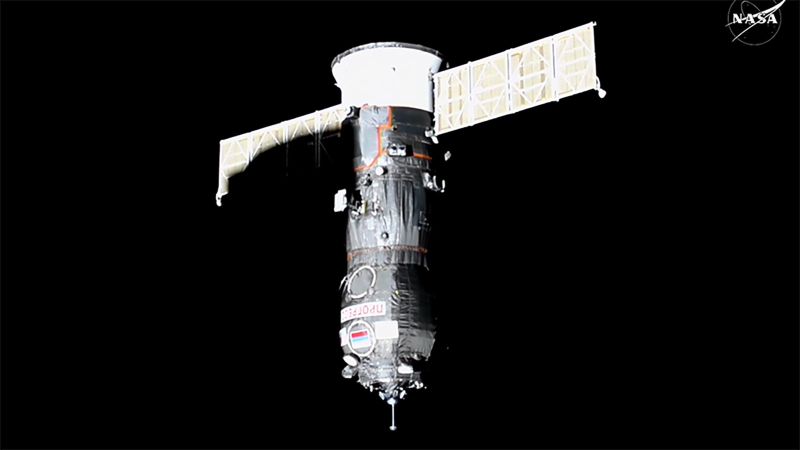In a recent incident aboard the International Space Station (ISS), Russian cosmonauts experienced a brief lockdown of a section of the orbiting laboratory due to an “unusual odor” detected from a visiting cargo spacecraft, Progress 90. The incident, confirmed by NASA on Sunday, highlights the constant challenges faced in maintaining safety in the unique environment of space.
The odor that raised concerns among the crew members was accompanied by “droplets” observed within the Progress spacecraft, leading NASA to assert that these phenomena were likely caused by “outgassing” from materials inside the capsule. Outgassing involves the release of gas that has absorbed within materials and is a known occurrence when manmade objects transition from Earth’s atmosphere into the extreme conditions of space. NASA representatives, including Kelly O. Humphries, emphasized that there are currently no safety concerns for the crew aboard the ISS.
The Progress capsule is uncrewed and is utilized for transporting science experiments, supplies, and propellant to the ISS. It operates using unsymmetric dimethylhydrazine and nitrogen tetroxide—both of which are highly toxic to humans. However, Humphries clarified that the unpleasant odor did not stem from these propellants, indicating that the issue was likely a thermal response involving other materials within the spacecraft.
NASA documented that the cosmonauts promptly shut the hatch connecting the Poisk module—a key segment of the ISS measuring 16 feet (approximately 4.8 meters) long and 8.4 feet (about 2.6 meters) wide—to the rest of the station after detecting the smell. Subsequently, ground flight controllers activated air scrubbing equipment as part of standard safety protocols, which helped to confirm that the odor likely originated from the visiting Progress spacecraft.
As operations continued, the crew noted that the odor dissipated quickly, allowing them to carry on with scheduled cargo transfers. NASA reassured that air quality sensors indicated normal levels of air quality inside the ISS, alleviating concerns about potential contamination from the odor.
The Progress cargo vehicle arrived at the ISS after successfully launching from the Baikonur Cosmodrome in Kazakhstan on November 21, delivering nearly three tons of essential supplies. This operation is part of a long history of resupply missions, highlighting the ongoing collaboration between Russian and American space agencies in maintaining the ISS.
However, the incident with Progress 90 underscores existing challenges on the ISS, particularly regarding another Russian-operated module, Zvezda. This module has faced issues related to a slow air leak, compelling cosmonauts to limit their access to it primarily for offloading cargo from visiting spacecraft. The situation has generated additional scrutiny regarding the integrity and long-term sustainability of the Russian portions of the station.
Since its inception in the year 2000, the ISS has served as an international microgravity laboratory, hosting diverse crews from over 20 countries. With current partnerships involving NASA, Roscosmos, the Canadian Space Agency, the European Space Agency, and the Japan Aerospace Exploration Agency, there are plans to sustain operations on the ISS through at least 2030. Nonetheless, Russian officials have not clearly committed to their involvement beyond 2028, creating uncertainty regarding future collaborations.
Recent insights from NASA’s Office of the Inspector General suggest that definitive plans regarding Roscosmos’ role in the ISS and its operations may remain unclear until 2025. This adds a layer of complexity to the ongoing international cooperation in space exploration, particularly in light of the unique challenges that arise from operating in an environment as hostile and unpredictable as space.
In summary, the recent incident aboard the ISS involving the Progress 90 spacecraft serves as a stark reminder of the need for continuous vigilance and adaptability in space missions, reflecting both triumphs and tribulations in the journey of human exploration beyond Earth.



